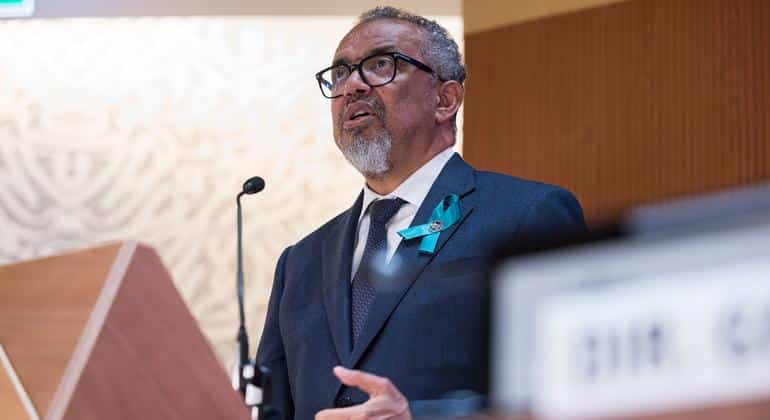Here’s the translation into American English:
—
At the recent opening of the 2025 World Health Assembly, the Director-General of the World Health Organization (WHO), Tedros Adhanom Ghebreyesus, highlighted the achievements made in the past year and emphasized the urgent need to increase global investment in health. During his speech, Ghebreyesus called on Member States to reinforce their financial support, underscoring the significant gap between military spending and health investments. According to his statements, the cost of a single stealth bomber or global military expenditure every eight hours is equivalent to the biennial budget of the WHO.
The Director-General appealed for a collective commitment to raise the funds necessary for the WHO to continue its essential activities, warning that the health of billions of people is at stake. “Our work is undoubtedly a precious legacy that we cannot abandon,” he stated, emphasizing the importance of building a healthier and more equitable future despite the numerous challenges the organization faces.
Furthermore, Ghebreyesus urged countries to adopt an international agreement that facilitates the prevention, preparedness, and response to pandemics. This agreement, which was finalized by consensus in April, aims to ensure equitable access to health solutions during global crises and to strengthen epidemiological surveillance comprehensively.
A critical aspect noted by the Director-General was the WHO’s reliance on voluntary funding, which represents a significant challenge. Despite efforts to increase contributions and establish the WHO Foundation, the organization is currently facing a deficit of over $500 million, with projections reaching $1.7 billion for the 2026-2027 budget. This lack of resources could compromise its capacity to fulfill its mandate and would require structural adjustments.
Ghebreyesus emphasized the necessity of continuing to invest in health systems, as preparedness and health security are essential following the COVID-19 pandemic. The WHO is supporting countries in strengthening these capabilities through an emergency framework that includes genomic surveillance and global health threat monitoring. In 2024, the WHO assessed more than 15 million signals, ensuring a rapid response to health threats.
The Director-General also highlighted significant achievements, including an increase in vaccination coverage worldwide and the distribution of over 27 million doses of malaria vaccines in 20 African countries. The organization also celebrates the certification of several countries as malaria-free and progress in eliminating neglected tropical diseases.
Despite these successes, the WHO faces critical challenges in emergency management. In 2024, it coordinated responses in 51 situations across 89 countries, deploying medical teams and specialized supplies. However, the resurgence of polio continues to be a major issue, with an increase in cases in Pakistan and Afghanistan underscoring the need to maintain vigilance and coordination in the fight against this disease.
Referrer: MiMub in Spanish










